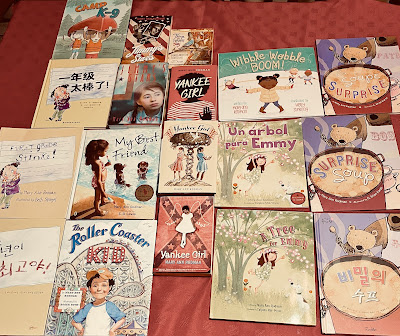Wham, bam, thank you, ma'am... it's over. It's over and you feel cheated. What a terrible ending! Maybe it was ludicrous, given the 400 previous pages. Maybe you didn't see it coming...and not in a good way. Maybe the writer got tired and looked for the nearest exit ramp.
Endings are your final impression of a book. A sucky ending is not likely encourage you to read another book by that author. And we authors do like return readers. (So do publishers.)
One of the reasons I became a writer was the awful endings of books as I read as a kid. The books available to me in the 60's were primarily written in the 50's and 40's, the Era of Perpetually Happy Endings. No names mentioned, but there were a couple of "teen romance" writers whose plain but brilliant female main character always landed her dream boat by the last page. If Dreamboat had discovered the inner beauty of Plain Jane, I would've been happy, but that's not what happened. In every single book, Jane suddenly became a curvaceous beauty, with a perfect complexion and shimmering hair. I can't tell you the number of times 10-year-old me threw a book across the room, yelling, "Real life isn't like that!" I vowed to myself I'd become a writer of books with Real Life endings.
The first Real Life ending I encountered (although I didn't realize it) was Charlotte's Web when I was 8. I cried for days (one of the few books that have made me cry.) I didn't really think very much about why E.B White chose to end his book that way, until I was in the Vermont College MFA program. Someone on the faculty--if only I could remember who--said, "Endings should be inevitable." Light bulbs! Fireworks! Lightening! Yes! But the lecturer was still talking, "Inevitable doesn't need to be predictable. The ending should be organic to what has come before." Ding ding ding! In two minutes, I learned the secret of a good ending.
Now all I had to do was write one.
There are people who don't write without an outline, complete with ending. I'm not one of those people. I know the beginning, I know some of what happens in the middle...but the end? The end is always as much of a surprise to me as I hope it is to the reader. If I have to think hard, then the end is neither inevitable or organic. It's just an ending.
In writing both of my middle grade novels, Yankee Girl and Jimmy's Stars, I thought I had the end firmly in mind and then... In Yankee Girl, several new characters came out of nowhere, jumped in the scene and took it to another place all together, with me, racing behind, trying to keep up. Jimmy's Stars had my main character remember something from chapter one--something I had forgotten--that ended the story for me. Organically. Inevitably.
Picture books are a little easier to end, because the story isn't as complicated. However, I had no idea how to end First Grade Stinks. I didn't so much write that one, as take dictation. My daughter came home from school every day with a new complaint about first grade. Why wasn't it cool, like kindergarten? I couldn't use reality here, because my daughter and her first grade teacher never came to terms. I had to let that one "germinate" in the computer files for a year as I contemplated what my character... wanted from first grade...and what she really needed. What she needed was a new attitude. Once she found that...the ending came all in a rush. Happily-ever-after-but with a twist of reality.
Not all my readers appreciate my endings. I've lost count of the kids who've asked "Why did such and such have to happen? That was so sad!" I ask them, "So what would the story be if that thing didn't happen?" The answer is usually, "Well then Ellie/Alice Ann/Lily would be happy."
"OK, now tell me your version of the story," I say. The young reader starts to retell the story until the troubling plot point. They fumble around for a minute, before saying "And they all lived happily ever after." Pause. "That's not a very good story, my way, is it?" Nope. (No conflict, no story...but that's a different post.) How the character (and author) handle and resolve conflict realistically makes a satisfying ending.
I'm sure there are kids all over the world, throwing my books across the room, yelling, "What a dumb ending!" But I'll bet they don't say "Real life isn't like that."
And they always ask about a sequel.
P.S. Indulge me a minute. This is my daughter, on the first day of kindergarten, and the same daughter, heading off to her first week of teaching her own Pre-K class. I could not be prouder of her. She also uses "extra story time" as a class reward. If you're a picture book writer and you're my friend, your books are in her classroom library.Posted by Mary Ann Rodman














2 comments:
I enjoyed reading about your process to endings. I like how you said they need to be realistic to the book rather than an all encompassing happily ever after. E. B. White takes the prize for the best beginning ever written, "Where is Papa going with that ax?"
Oh, my gosh...you make so much sense. Now I just need to go do exactly this! Thanks for the tips and make it sound so possible.
Post a Comment